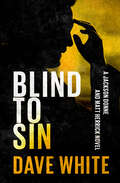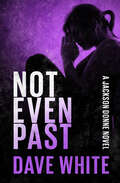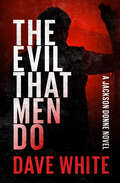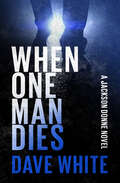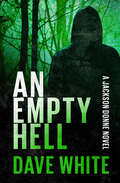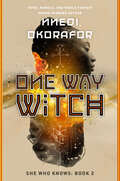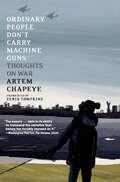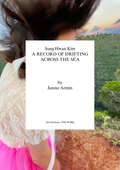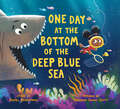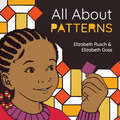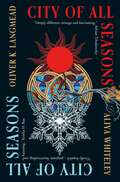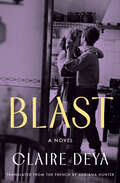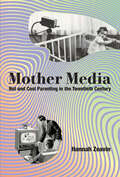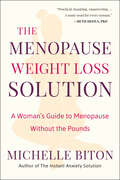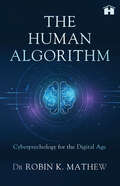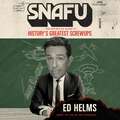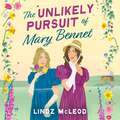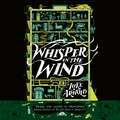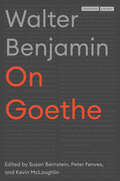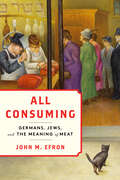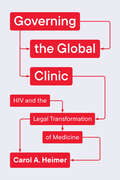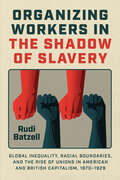- Table View
- List View
Blind to Sin (The Jackson Donne Novels)
by Dave WhiteThe line between good and evil explodes in this pulse-pounding crime thriller from &“a fresh, vital voice energizing the private-eye novel&” (Laura Lippman, New York Times–bestselling author). Though he&’s a former narcotics cop, Jackson Donne doesn&’t hate being in prison. It&’s his penance after pleading guilty to murdering a state senator. He&’s even made a friend, a protector. High school basketball coach and private investigator Matt Herrick&’s father Kenneth is Donne's cellmate. Things could always be worse . . . Herrick hasn&’t seen his parents in years—not since they pulled a bank heist which resulted in his father&’s arrest and his mother&’s disappearence. All that&’s about to change. Someone with a lot of power and money is springing his father from prison for the job of a lifetime, stealing millions from the Federal Reserve in New Jersey. And Donne is going along for the ride. Given the freedom he never wanted, Donne finds himself torn between loyalty and the law, between father and son, between heaven and hell . . . Both he and Herrick will have to choose who they&’re willing to live for—and who they&’d die to protect . . .Praise for Dave White and the Jackson Donne Novels &“Dave White is everything you hope for in a crime novelist, delivering both white-knuckle suspense and nuanced characters, propulsive action and an emotional wallop. These are books that both invigorate the genre and are also, truly, built to last.&” —Megan Abbott, New York Times–bestselling author &“It is amazing how good an author [White] has become, breathing life into the PI genre like Dennis Lehane did years ago with Gone Baby Gone.&” —Sons of Spade
Not Even Past (The Jackson Donne Novels)
by Dave WhiteThe acclaimed author delivers &“a tremendous jolt of adrenaline . . . then ratchets the action back up for a breakneck finish&” in this gritty crime thriller (The Florida Times-Union). Six years ago, Jackson Donne&’s fiancée, Jeanne, died in a car crash—a hit-and-run with a drunk driver. It was an open-and-shut case with few questions asked, mostly because Donne was in no state to ask any. Now the former-PI-turned-college-student has finals coming up and a wedding to plan with the new woman in his life. He&’s something he hasn&’t been in a long time: happy. But that unfamiliar feeling doesn&’t last. Donne receives an email with a link to a video of Jeanne being held captive, alive—for now. Donne&’s investigative skills have faded. He has no contacts, no one to turn to—except for the dodgy ex-partner he had when he was a cop, the other man who loved Jeanne. Donne knows that each step into the past is a piece of the future he&’s throwing away. But the truth is out there—on the violent New Jersey streets he once knew like the back of his hand . . . &“White is one of a group of younger writers reimagining the P.I. novel. . . . This book flies.&” —Milwaukee Journal Sentinel &“Dave White brings the goods. Skillfully crafting a tale that thriller fans will devour at lightning speed, yet meaty enough that mystery fans will delight in fitting the pieces together.&” —Crimespree Magazine
The Evil That Men Do (The Jackson Donne Novels)
by Dave White&“Cements Dave White&’s place as one of the rising stars of crime fiction. A gripping read from an author who has infused the PI novel with fresh blood.&” —Jason Pinter, bestselling author of Hide Away Life looks bleak for Jackson Donne, who had his PI license stripped during the course of his last case. Now, he&’s working nighttime security at a storage facility in New Jersey, a job that gives him plenty of time to think about what went wrong. But life can change in one phone call—especially if it&’s about Donne&’s estranged family. His sister, Susan, delivers the news that their mother is in hospice suffering from dementia and keeps rambling about their grandfather murdering someone. Susan wants Donne to investigate. Within twenty-four hours, his aunt and uncle turn up dead, and his brother-in-law&’s Manhattan restaurant has been blown up. Now it&’s up to Donne to right the wrongs of his family—or die trying . . . &“White&’s stunning second crime novel to feature ex-cop and ex-PI Jackson Donne fulfills the promise of his debut, When One Man Dies.&” —Publishers Weekly (starred review) &“Intricate plotting and nonstop action make this a nail-biting read from start to finish. White, winner of the Derringer Award for When One Man Dies, is a writer to watch.&” —Library Journal &“Readers looking for top-notch hard-boiled noir fiction featuring an intriguing protagonist and complex characterizations need look no further than Dave White&’s deftly plotted novels.&” —BookLoons
When One Man Dies (The Jackson Donne Novels)
by Dave White&“A terrific novel, a unique and artful blend of the PI and the Police Procedural in a plot as nicely tangled and sexually violent as a cat fight.&” —James Crumley, Dashiell Hammett Award–winning author It&’s been four years since Jackson Donne went from cop to private investigator, so he&’s seen his share of trouble in New Brunswick, New Jersey. And he doesn&’t like it when it hits too close to home—or, in this case, too close to the Olde Towne Tavern, Donne&’s home-away-from-home. His drinking buddy, Gerry Figuroa, gets killed right outside the bar in a hit-and-run. Just when Donne is looking for a fresh start by returning to college at twenty-eight years old, he&’s drawn back into the game. All this while investigating a suspected cheating husband. Donne soon discovers that Gerry was not the man he thought he knew. Instead, he&’s someone whose secrets will bring down a world of pain on his friends and relatives. And when Donne realizes that both of his cases have dangerous underworld connections, he&’s about to be launched into a world of violence . . . &“[A] remarkable debut novel. . . . White manages the neat trick of respecting the genre&’s traditions while daring to nudge it toward something new and unexpected.&” —Laura Lippman, New York Times–bestselling author &“White has written a PI novel that is both traditional and fresh, one of the few new talents to join this much-plowed field with something interesting and original to say.&” —Chicago Sun-Times &“Derringer Award–winner White&’s engrossing, evocative debut novel will grab most readers from its opening sentences.&” —Publishers Weekly (starred review)
An Empty Hell (The Jackson Donne Novels)
by Dave White&“[A] dark and extremely suspenseful thriller . . . turns Northern New Jersey into a setting worthy of any classic noir detective series.&” —Connecticut Post Two former cops are dead and they have one thing in common: Jackson Donne, who helped take them down when he was on the force. The prevailing thought is that Donne has finally lost it and is murdering old colleagues. But New Jersey&’s most wanted is now in rural Vermont with a new name and a new life. Donne is scraping by doing odd jobs at a motel, thanks to the owner, Mario, who asks no questions as long as the work is done. But when Mario disappears, Donne uncovers connections between them that are more than coincidences. Both men ran from their pasts. Both men have blood on their hands. And now someone is using Mario to get to Donne. If Donne has learned anything, it&’s this: you can run from the dirty cops in New Jersey, but you can&’t hide. And this time, they&’re unleashing hell . . . &“An Empty Hell is a compulsive redemption story that speeds to a confrontation in a high school gym and takes the series to a place rich with possibilities.&” —Milwaukee Journal Sentinel &“Dynamite . . . the characters, the situations, the pacing, the structure, and the writing are so good.&” —Publishers Weekly &“It is amazing how good an author [White] has become, breathing life into the PI genre like Dennis Lehane did years ago with Gone Baby Gone.&” —Sons of Spade
One Way Witch (SHE WHO KNOWS)
by Nnedi OkoraforSet in the universe Africanfuturist luminary Nnedi Okorafor first introduced in the World Fantasy Award-winning Who Fears Death, One Way Witch is the second in the She Who Knows trilogyThe world has forgotten Onyesonwu.As a teen, Najeeba learned to become the beast of wind, fire and dust: the kponyungo. When that took too much from her, including the life of her father, she let it all go, and for a time, she was happy — until only a few years later, when the small, normal life she&’d built was violently destroyed. Now in her forties and years beyond the death of her second husband, Najeeba has just lost her beloved daughter. Onyesonwu saved the world. Najeeba knows this well, but the world does not. This is how the juju her daughter evoked works. One other person who remembers is Onyesonwu&’s teacher Aro, a harsh and hard-headed sorcerer. Najeeba has decided to ask him to teach her the Mystic Points, the powerful heart of sorcery. There is something awful Najeeba needs to kill and the Mystic Points are the only way. Najeeba is truly her daughter&’s mother.When Aro agrees to help, Najeeba is at last ready to forge her future. But first, she must confront her past — for certain memories cannot lie in unmarked graves.
Ordinary People Don't Carry Machine Guns: Thoughts on War
by Artem ChapeyeA reporter and novelist who is also a soldier in the Ukrainian army reconsiders his pacifism and the choices one makes when war is waged against you."Chapeye represents a modern-day Ukrainian counterpart to classic American writers like Mark Twain or O. Henry, capturing the dignity and respect his characters might not get but nonetheless long for and deserve." —Kate Tsurkan, Los Angeles Review of BooksIn Ordinary People Don't Carry Machine Guns, Artem Chapeye reveals his war, intimate and senseless, withholding nothing about his motivations, his nightmares, his new relationship with the world. Here one man, a pacifist turned fighter, a story writer turned soldier, a father and husband, considers the reasons for and reactions to war on a very personal level.An avowed pacifist until 2022, Chapeye joined the Ukrainian army in the first days of the Russian invasion. He tries to understand the large-scale decision-making that has a defining impact on both individual citizens and society-at-large: many of his fellow soldiers never considered enlisting before finding themselves at war; others flee the country. He wonders from the front lines what his young children at home are doing and what they&’re feeling.The book is written in three parts, offering historical analogies and literary references throughout.&“When Darkness Comes&” relates the first days of the full-scale invasion in February 2022 when lives and the peace were shattered.&“It&’s Necessary to Cultivate Your Garden&” details the experience of the everyday people of Ukraine, workers and peasants, who look forward to returning to simpler lives.The last section, &“People Aren&’t Divided into Brands,&” critiques the elitism of those who consider themselves above those who &“simply&” fight.Deeply thought-provoking, intelligent, and heartbreaking, this is an essential book for anyone who wants to understand the ways that war can change everything.
Sung Hwan Kim: A Record of Drifting Across the Sea (Afterall Books / One Work)
by Janine ArminA richly illustrated exploration of Sung Hwan Kim&’s complex record of migrant stories, displacement and belonging, border-crossings and translation.In A Record of Drifting Across the Sea (2017–), Sung Hwan Kim turns to past histories of migration. The artist parses the traces—archival and bodily—left by undocumented Korean migrants who came to the US by way of Hawai&’i at the turn of the last century, and ponders over their impact on other migrant and indigenous communities. As an ongoing film and installation series, comprising two chapters and a third in progress, A Record unsettles the limits of the "one work" with its distributive, open-ended and collaborative nature. In this speculative inquiry, Janine Armin explores each chapter in Kim&’s multilayered work as a mycelial network of feelers entangling and extending the wider work in process. Engaging history through the senses, folklore and myth, as much as through archival material, Kim navigates and crosses the boundaries between displacement and belonging. Focusing on the artist&’s attempt to escape from representation, Armin illuminates and attends to the different stories and non-sovereign ways of being together towards which his work points us. This title is part of the One Work book series, which focuses on artworks that have significantly changed the way we understand art and its history.
One Day at the Bottom of the Deep Blue Sea
by Daniel BernstromA clever little girl outsmarts a silly hungry shark in this rhyming underwater read-aloud romp—perfect for ages 3-7.A clever little girl "with a net for catching pearls" meets a shark who wants nothing more than to eat her for dinner. Diving into these gorgeous pages, readers will find nothing short of a classic tale: a bully being shown up by his weaker and far more clever adversary! An ebullient and unabashedly entertaining read aloud, One Day at the Bottom of the Deep Blue Sea has enough bite to excite readers of all ages.Delightful characters created by Brandon James Scott are perfectly matched to Daniel Bernstrom's rollicking tale of bravery, trickery and undersea adventure.
All About Patterns (All About Noticing)
by Elizabeth RuschAn enlightening picture book exploration about how patterns fill and shape our everyday lives. This mindful meditation challenges kids to see the world differently.What do you know about patterns? There are simple alternating patterns and more complex ones that spin and spread out. There are patterns in stories and patterns in music. When you dance, you're making patterns with your whole body.You might even notice a comforting pattern to your day. When that pattern is broken, everything can feel chaotic. But sometimes breaking a pattern can make room for a new one worth repeating!A thought-provoking and visually stunning exploration of the math, art, and emotion of patterns.
City of All Seasons
by Aliya Whiteley Oliver K. LangmeadA vibrant and emotional science fantasy about cousins trapped in mirrored worlds – the resplendent and verdant summer city and the ice-carved wastes of the winter city. For fans of Every Heart a Doorway and This is How You Lose the Time War."A beautifully strange and unique fable." The Guardian's Best SF of 2024 on Aliya Whiteley"A unique and memorable work." The Guardian's Best SF of 2024 on Oliver K. Langmead"An elegantly told meditation on how we can&’t leave ourselves behind." Esquire's 30 best SF Books of 2024 on Oliver K. LangmeadWelcome to Jamie Pike&’s Fairharbour – a city stuck in perpetual winter, its windows and doorways bricked shut to keep out the freezing cold, its residents striving to survive in the arctic conditions.Welcome to Esther Pike&’s Fairharbour – a city stuck in constant summer, its walls crumbling in the heat, its oppressive sunlight a relentless presence.Winter and Summer alike, have both fallen under the yoke of oppressive powers, that have taken control after the cataclysm. But both Fairharbours were once a single, united city. And in certain places, at certain times, one side can catch a glimpse of the other. As Jamie and Esther find a way to communicate across the divide, they set out to solve the mystery of what split their city in two, and what, if anything, might repair their fractured worlds.
Blast: A Novel
by Claire DeyaAn unforgettable portrait of suffering, hope, and love in post–World War II France, this cinematic debut novel uncovers the secrets of a little-known era.In spring of 1945, the war is about to end. The French coast is littered with mines the Nazis hid under the sand to prevent the Allies from landing. In Hyères, on the Côte d&’Azur, German prisoners are forced to clear the beaches. Alongside them, members of the Resistance and other French volunteers face the same dangerous task. With no maps of the bombs&’ locations, they must be guided only by the faint trembling of the sticks they carry to detect them, in terror of being blown up. French and Germans work together, depending on each other—what grim irony—to survive, with the common goal of deactivating the mines, one by one. But this is not their only goal: Lukas plans to escape, Saskia wants to know who betrayed her family, Vincent is looking for Ariane, the woman he loves, and the Germans hold the key to her disappearance. Historian by training and screenwriter by profession, Claire Deya brilliantly portrays the aftermath of a war that won&’t truly be over until all the mines have been deactivated, showing that &“people who think the fighting stops when you lay down your arms are wrong.&” Blast captures the beginning of a postwar period in which everyone must rebuild their lives and identities, and overcome the obsessions that prevent them from healing. Revenge, mistrust, and guilt, but also solidarity, love, and forgiveness intertwine in this extraordinary novel that readers won&’t be able to put down until the surprising ending.
Mother Media: Hot and Cool Parenting in the Twentieth Century
by Hannah ZeavinAn essential history for understanding how we mother now, and how motherhood itself became a medium—winner of the Brooke Hindle Award from the Society for the History of Technology.From the nursery to the prison, from the clinic to the commune, Mother Media tells the story of how we arrived at our contemporary understanding of what a mother is and how understandings of &“bad&” mothering formed our contemporary panics about &“bad&” media. In this book, leading historian of psychology Hannah Zeavin examines twentieth-century pediatric, psychological, educational, industrial, and economic norms around mediated mothering and technologized parenting. The book charts the crisis of the family across the twentieth century and the many ingenious attempts to remediate nursemaid and mother via speculative technologies and screen media.Growing out of her previous award-winning book The Distance Cure, which considered technologized care, the book lays bare the contradictions of techno-parenting and how it relates to conceptions of &“maternal fitness,&” medical redlining, and surveillance of children, parents, and other caregivers. The author offers narratives of parenting in its extremity (for example, Shaken Baby Syndrome) and its ostensible banality (for example, the Nanny Cam) and how the two are often intertwined. Ultimately, Zeavin grapples with a simple contradiction: technology is seen and judged as harmful in domestic and educational spaces, even as it is a saving grace in the unending labor of raising a family.
The Menopause Weight Loss Solution: A Woman's Guide to Menopause Without the Pounds
by Michelle BitonThe Essential Guide to a Healthy, Positive, and Empowering Menopause Experience.You deserve to feel great about yourself. Take control of your menopause journey and your future. The Menopause Weight Loss Solution is the ultimate self-help guide for women seeking to stay healthy, positive, and beautiful during menopause.Packed with proven lifestyle tips and research-backed weight loss strategies, this book transforms the challenging mid-life transition into a period of opportunity and growth, helping you to feel empowered to navigate menopause without the extra pounds.The Menopause Weight Loss Solution uses a unique six-step program to help you avoid menopausal weight gain naturally by:• Stimulating your metabolism• Harnessing the power of your vagus nerve• Reinforcing eight key nutritional strategies• Incorporating daily pelvic floor and core exercises• Nurturing mindfulness and mindful eating• Knowing your female powers with confidenceThe Menopause Weight Loss Solution includes a friendly and accessible menopause plan that provides women with practical strategies to:• Lose weight naturally• Manage their hormones• Take control of their nervous system• Improve their moods• Feel more comfortable with their body• Change their mindsetResearch shows that losing just 10 pounds or 10% of body weight can significantly reduce hot flashes, night sweats, and other menopause-related symptoms. This menopause book demonstrates that weight loss during menopause doesn&’t have to be difficult.Whether you're seeking a hormone balance book, menopause nutrition advice, or solutions for menopause weight gain, The Menopause Weight Solution is your go-to menopause book. Embrace menopause health and achieve hormone balance with this comprehensive guide. It's the perfect book for women's health and weight loss for women.
The Human Algorithm
by Robin K. MathewIn today&’s hyperconnected world, our lives have become increasingly intertwined with the technology we interact with. While innovations like smartphones and the Internet have brought unprecedented convenience and connectivity, they have also introduced new risks and challenges.In The Human Algorithm, Dr Robin K. Mathew takes readers on an eye-opening exploration of the complex digital landscape and our ever-evolving engagement with it. With chapters delving into smartphone addiction, the impact of technology on cognitive development, threats such as cyberbullying, online predators, and the dark web, this book shines a revelatory light on the often-overlooked aspects of our online existence. This comprehensive work also dedicates chapters to the internet&’s role in fuelling anxiety and hypochondria, the emergence of cyber dating and romance, and the potential of artificial intelligence (AI), among other crucial topics.All in all, this richly researched and compellingly argued compendium will equip you with the knowledge and insights to navigate the digital age with awareness and resilience.
SNAFU: the hilarious new book from The Office and Hangover comedian
by Ed HelmsFrom actor, comedian, writer, and host of the hit history podcast SNAFU, Ed Helms brings you an absurdly entertaining look at history's greatest screwups, complete with lively illustrations. History contains a plethora of insane screwups-otherwise known as SNAFUs. Coined during World War I, SNAFU is an acronym that stands for Situation Normal: All F*cked Up. In other words, "things are pretty screwed up, but aren't they always?"Spanning from the 1950's to the 2000's, Ed Helms steps in as unofficial history teacher for a deep dive into each decade's craziest SNAFUs. From planting nukes on the moon to training felines as CIA spies to weaponizing the weather, this book will unpack the incredibly ironic decision-making and hilariously terrifying aftermath of America's biggest mishaps.Filled with sharp humor and lively illustrations, SNAFU is a wild ride through time that not only entertains but offers fresh insights that just might prevent history from repeating itself again and again.
Hardly A Gentleman (Accidental Brides)
by Eloisa JamesNew York Times bestselling author Eloisa James returns to the Accidental Brides series with a romance about a forced marriage between a feisty heroine and a Scottish laird . . . neither of whom have plans to marry, let alone fall in love.Desperate after her Season comes to a spectacularly disastrous end, the Honourable Miss Clara Vetry jumps into a carriage hired to take a housekeeper to Scotland.The laird of Castle CaerLaven has no interest in a wife, especially a love match - but when Caelan sees his new housekeeper, he changes his mind. Marriage to a delectable bookworm strikes him as a perfect arrangement.To his surprise, Clara refuses his proposal once . . . and again . . . yet again.When her true identity is revealed, and they're forced to marry, Caelan realizes he has a far more crucial challenge.He finally has Clara's hand - but how will he ever win her heart? .......................Praise for Eloisa James:'Eloisa James writes with a captivating blend of charm, style, and grace that never fails to leave the reader sighing and smiling and falling in love. Her style is exquisite, her prose pure magic' Julia Quinn'The romance galaxy is filled with luminous stars, but few twinkle as brightly as James, who . . . once again dazzles readers with superbly conceived characters, a sublimely sensual love story, and sparkling wit' Booklist (starred review)
The Unlikely Pursuit of Mary Bennet
by Lindz McLeod'A triumph of a book, and an utter delight from start to finish' Thomas D. Lee, the Sunday Times bestselling author of Perilous TimesJane Austen meets Bridgerton in this slow-burn sapphic romance between Charlotte Lucas and Mary Bennet, taking place four years after the end of Pride and Prejudice.It is a truth universally acknowledged that love always blooms in the unlikeliest of places.When Mr. Collins dies after just four years of marriage, Charlotte is lost. While not exactly heartbroken, she will soon have to quit the parsonage that has become her home. In desperate need of support, she writes to her best friend, Lizzie. Unable to leave Pemberley, Lizzie sends her sister, Mary Bennet, to offer support in her stead.To Charlotte's surprise, Mary Bennet is nothing like she remembers. Mary's discovery of academia and her interest in botany (as well as getting out from under her mother's thumb) have caused her to flourish. Before long, Charlotte is enraptured - with Mary, and with the possibilities that lie beyond their societal confines. With each stolen glance and whispered secret, their friendship quickly blossoms into something achingly real.But when her time at the parsonage begins to dwindle and potential suitors appear, Charlotte must make a choice - the safety and security of another husband, or a passionate life with Mary outside the confines of the ton's expectations.Set in the beloved world of Jane Austen, The Unlikely Pursuit of Mary Bennet is the swoony sapphic regency romance that readers have been waiting for.
My Best Friend's Honeymoon: A friends-to-lovers romance with sweetness, spice, and a holiday too hot to waste
by Meryl Wilsner'Both undeniably sexy and incredibly sweet' OLIVIA DADE'Vibrant, intoxicating romance' ASHLEY HERRING BLAKESometimes to find a happily ever after, you just have to ask ❤️🔥Elsie Hoffman has been engaged to her college boyfriend for a year and a half. Ginny Holtz has been in love with Elsie for almost a decade and a half.When Elsie discovers her fiancé already planned their wedding and honeymoon as a surprise and she's expected to be in a white dress in seven days, she swiftly realizes she's let herself become too comfortable with a future she never wanted. She breaks things off, and a week later is on a plane to the Caribbean for her non-refundable honeymoon with her best friend Ginny instead.Ginny thinks it's high time Elise learned how to speak up for herself. So, they make a deal with her. For the next week, Elsie can have whatever she wants, wherever, however, and whenever she wants it, as long as she asks. They never expected Elsie to want them.What starts as choosing activities and taking selfies soon turns to toe-curling kisses and much, much more. But what happens when the honeymoon is over?Meryl Wilsner's My Best Friend's Honeymoon is about not only learning to ask for what you want, but for the happiness you deserve.💕Why readers LOVE Meryl Wilsner . . . 💕'Sexy and compelling, reading it is like being in on the most tantalizing secret' DAHLIA ADLER'[A] delightfully steamy sapphic romance . . . fun and entertaining' Kirkus Reviews'Wilsner is one of the hottest contemporary f/f romance writers right now' Electric Literature, 'The Most Anticipated LGBTQ+ Books for Fall 2023''Wilsner makes this sports romance a winner' Publishers Weekly
Whisper in the Wind: Book Four in the Fetch Phillips Archives: a fantasy set in a world where the magic has disappeared... (Fetch Phillips #4)
by Luke ArnoldThe world has lost its magic - literally - and Fetch is done being a hero.Once a detective, all he wants now is to run his café in peace. Sunder City is still recovering from the sudden and violent end of magic, and if one man can't solve all its problems, he can at least stop some people going hungry. But when a kid on the run shelters in Fetch's café, and a chain of gruesome murders begins among Sunder's high and mighty, trouble is brought to Fetch's door.There's a word whispered on the wind, and that word is revolution...A brand new fantasy adventure from Luke Arnold; a private detective solves cases in a fantasy world where magic has disappeared.Praise for this series:'An effortlessly readable series that could be the illegitimate love child of Terry Pratchett and Dashiell Hammett' Kirkus'Sure to have readers coming back for more' Publishers Weekly'A marvellous noir voice; Luke Arnold has captured the spirit of the genre perfectly' Peter McLean'Sunder City [is] an evocative creation, it has echoes of Ankh-Morpork, but also a broken melancholy all of its own' SFX
On Goethe (Cultural Memory in the Present)
by Walter BenjaminOn Goethe contains the full range of Walter Benjamin's reflections on the central figure in modern German culture. The writings in this volume—newly translated, fully annotated, and framed by an extensive introduction—display a variety of styles and cover a vast array of topics. The collection revolves around two strikingly different essays. Whereas "Goethe's Elective Affinities" develops a theory of critique in which a work is illuminated wholly from within itself, an article Benjamin wrote on Goethe for the Soviet Encyclopedia represents his first large-scale attempt to elaborate a historical-materialist methodology. The other thirty translations stand in similarly productive tension with one another. Some are concerned with concepts of beauty and categories of the aesthetic, others with the relation of art to politics and the status of "classical authors" in contemporary culture, and still others with what remains of humanistic traditions in the wake of their disappearance under fascist regimes and what synthesis is required for the construction of a historical object. The volume provides a glimpse into the laboratory of Benjamin's thought, while granting readers a series of insights into the epochal phenomena that gather around the name "Goethe."
All Consuming: Germans, Jews, and the Meaning of Meat (Stanford Studies in Jewish History and Culture)
by John M. EfronAn engaging 700-year history of meat at the intersection of German and Jewish culture, uniquely illuminating the rich, fraught, and tragic history of German Jewry. In Judaism, meat is of paramount importance as it constitutes the very focal point of the dietary laws. With an intricate set of codified regulations concerning forbidden and permissible meats, highly prescribed methods of killing, and elaborate rules governing consumption, meat is one of the most visible, and gustatory, markers of Jewish distinctness and social separation. It is an object of tangible, touchable, and tastable difference like no other. In All Consuming, historian John M. Efron focuses on the contested culture of meat and its role in the formation of ethnic identities in Germany. To an extent not seen elsewhere in Europe, Germans have identified, thought about, studied, decried, and gladly eaten meat understood to be "Jewish." Expressions of this engagement are found across the cultural landscape—in literature, sculpture, and visual arts—and evident in legal codes and commercial enterprises. Likewise, Jews in Germany have vigorously defended their meats and the culture and rituals surrounding them by educating Germans and Jews alike about their meaning and relevance. Exploring a cultural history that extends some seven hundred years, from the Middle Ages to today, Efron goes beyond a discussion of dietary laws and ritual slaughter to take a broad view of what meat can tell us about German-Jewish identity and culinary culture, Jewish and Christian religious sensibilities, and religious freedom for minorities in Germany. In so doing, he provides a singular window into the rich, fraught, and ultimately tragic history of German Jewry.
Writing Science in Plain English, Second Edition (Chicago Guides to Writing, Editing, and Publishing)
by Anne E. GreeneAn updated edition of the essential guide for all scientists—from undergraduates to senior scholars—who want to produce prose that anyone can understand. Scientific writing is often dry, wordy, and difficult to understand. But, as biologist and experienced teacher of scientific writing Anne E. Greene shows in Writing Science in Plain English, writers from all scientific disciplines can learn to produce clear, concise prose by mastering just a few simple principles. This short, focused guide presents roughly a dozen such principles based on what readers need to understand complex information, including concrete subjects, strong verbs, consistent terms, organized paragraphs, and correct sentence structure. Greene illustrates each principle with real-life examples of both good and bad writing and shows how bad writing might be improved. She ends each chapter with revision exercises (and provides suggested answers in a separate key) so that readers can come away with new writing skills after just one sitting. To help readers understand the grammatical terms used in the book, an appendix offers a refresher course on basic grammar. For this second edition, Greene has incorporated the latest research on what makes writing effective and engaging and has revised or replaced exercises and exercise keys where needed. She has also added new features that make it easier to navigate the book. A new resource for instructors who use Writing Science in Plain English in their classes is a free, online teacher’s guide. Drawn from Greene’s long experience teaching students how to write science clearly, the teacher’s guide provides additional lectures, assignments, and activities that will inform and enliven any class.
Governing the Global Clinic: HIV and the Legal Transformation of Medicine (Chicago Series in Law and Society)
by Carol A. HeimerA deep examination of how new, legalistic norms affected the trajectory of global HIV care and altered the practice of medicine. HIV emerged in the world at a time when medicine and healthcare were undergoing two major transformations: globalization and a turn toward legally inflected, rule-based ways of doing things. It accelerated both trends. While pestilence and disease are generally considered the domain of biological sciences and medicine, social arrangements—and law in particular—are also crucial. Drawing on years of research in HIV clinics in the United States, Thailand, South Africa, and Uganda, Governing the Global Clinic examines how growing norms of legalized accountability have altered the work of healthcare systems and how the effects of legalization vary across different national contexts. A key feature of legalism is universalistic language, but, in practice, rules are usually imported from richer countries (especially the United States) to poorer ones that have less adequate infrastructure and fewer resources with which to implement them. Challenging readers to reconsider the impulse to use law to organize and govern social life, Governing the Global Clinic poses difficult questions: When do rules solve problems, and when do they create new problems? When do rules become decoupled from ethics, and when do they lead to deeper moral commitments? When do rules reduce inequality? And when do they reflect, reproduce, and even amplify inequality?
Organizing Workers in the Shadow of Slavery: Global Inequality, Racial Boundaries, and the Rise of Unions in American and British Capitalism, 1870–1929
by Rudi BatzellAn original analysis of the relationship between slavery and the labor movement in the late-nineteenth and early twentieth centuries. During the rise of the labor movement in the late nineteenth century, why were American workers unable to organize inclusive trade unions like those formed by their counterparts in the United Kingdom? Comparing American and British capitalism in the port cities of Baltimore and Liverpool and the steel cities of Pittsburgh and Sheffield, Rudi Batzell reveals that the answer lies in the legacies of slavery and entrenched structures of racial inequality. Strikebreaking succeeded more often in the United States because landless Black Americans were, out of economic desperation, more likely to become scabs and fracture the class solidarity of any union movement. Batzell shows, in short, how racism was and is deeply connected to class, migration, and capitalism in a global economy marked by slavery and empire. In emphasizing the geography of economic inequality, this book offers new clarity on the late-nineteenth-century successes and failures of working-class formation. More broadly, Organizing Workers in the Shadow of Slavery makes it clear that the pursuit of justice today will require sustained economic reparations for slavery and colonialism.
